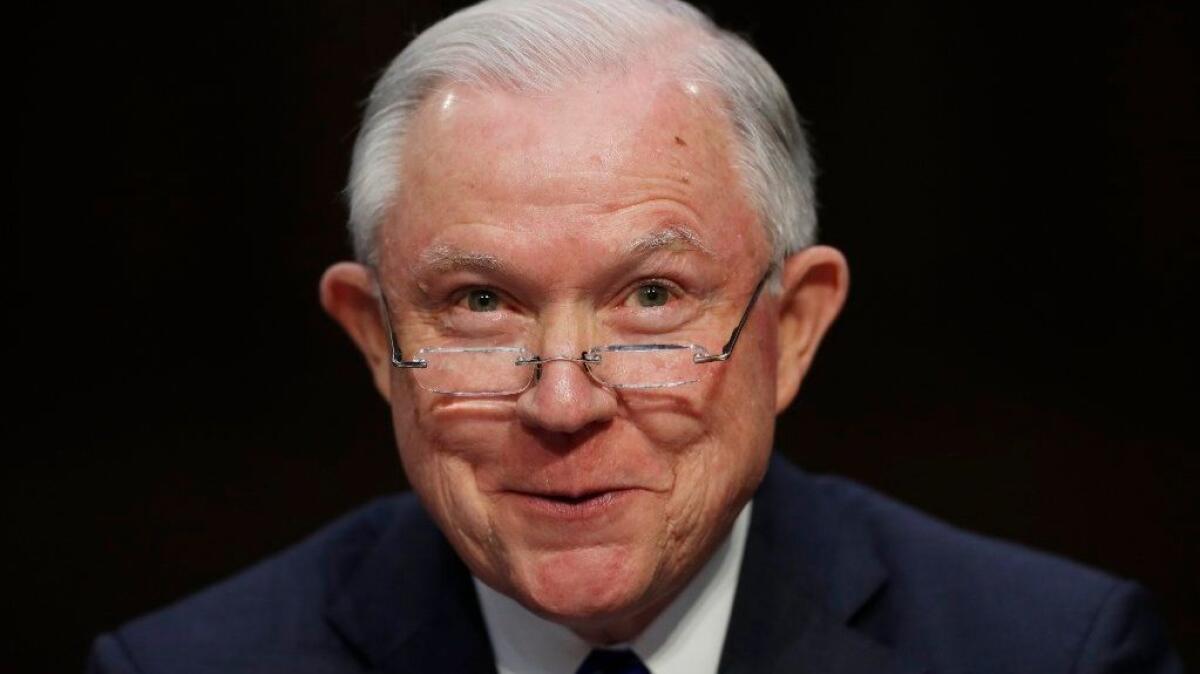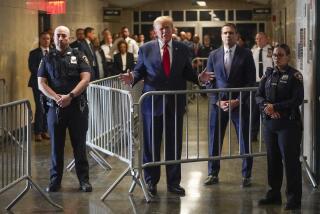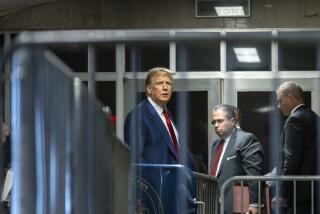Opinion: Trump and Sessions are still telling different stories about Comey

Early Wednesday morning, President Trump tweeted: “As it has turned out, James Comey lied and leaked and totally protected Hillary Clinton. He was the best thing that ever happened to her!”
That was an awkward prelude to testimony later in the day by Atty. Gen. Jeff Sessions before the Senate Judiciary Committee. Only a few hours after Trump portrayed Comey as a friend of Hil, Sessions was reiterating his view that Comey committed a fireable offense by mishandling the investigation of Clinton’s use of a private email server. In other words, he treated Clinton unfairly.
Of course, that was also supposedly Trump’s view on May 9, the day the FBI director was cashiered. According to a White House news release, Trump fired Comey “based on the clear recommendation of Deputy Atty. Gen. Rod Rosenstein and Atty. Gen. Jeff Sessions.”
Attached to Comey’s pink slip was a memo in which Rosenstein wrote: “I cannot defend the director’s handling of the conclusion of the investigation of Secretary Clinton’s emails, and I do not understand his refusal to accept the nearly universal judgment that he was mistaken.”
But this explanation for Comey’s firing was thrown into doubt on May 11 when Trump sat for an interview with NBC’s Lester Holt. Trump told Holt that when he decided to fire Comey, “I said ‘you know, this Russia thing with Trump and Russia is a made-up story, it’s an excuse by the Democrats for having lost an election that they should have won.’”
Some have suggested that this doesn’t necessarily mean that Trump fired Comey to try to obstruct the investigation into possible collusion between his campaign and Russia. Maybe his real objective was simply to get rid of an FBI director who wouldn’t say in public what he told Trump privately: that the president wasn’t a target of the investigation.
Either way, Trump’s reasons for getting rid of Comey seem to differ from those of Sessions and Rosenstein.
On Wednesday senators asked Sessions whether Trump really fired Comey to end the investigation into Russian interference and possible collusion with Trump’s campaign. Session wouldn’t comment. Asked by Sen. Dianne Feinstein if Trump mentioned Russia, Sessions said he couldn’t “confirm or deny the existence of any communication with the president that I consider confidential.”
But whether or not Trump said something to Sessions about “this Russia thing,” the president’s tweet on Wednesday further undermines the notion that he was simply channeling Sessions and Rosenstein’s concerns. (The New York Times reported last month that special counsel Robert S. Mueller III has a copy of an earlier draft of a letter dismissing Comey.)
If Sessions isn’t going to talk about his conversations with Trump, there may be other ways for Mueller to gain insight into the president’s motivations in firing Comey. On Monday, Mueller’s team met with former White House Press Secretary Sean Spicer, and it’s not unthinkable that Trump himself will be asked to sit for an interview.
If he’s willing to explain himself to Lester Holt, why not to Bob Mueller?
Follow the Opinion section on Twitter @latimesopinion and Facebook
More to Read
A cure for the common opinion
Get thought-provoking perspectives with our weekly newsletter.
You may occasionally receive promotional content from the Los Angeles Times.







